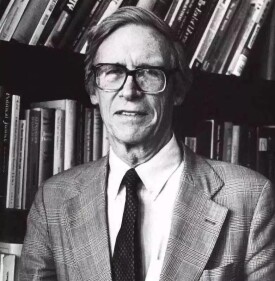約翰·羅爾斯
約翰·羅爾斯
約翰·羅爾斯(John Bordley Rawls,1921年2月21日-2002年11月24日),美國政治哲學家、倫理學家、普林斯頓大學哲學博士,哈佛大學教授,寫過《正義論》、《政治自由主義》、《作為公平的正義:正義新論》、《萬民法》等名著,是20世紀英語世界最著名的政治哲學家之一。
約翰·羅爾斯(John Bordley Rawls.1921年(辛酉年)2月21日-2002年(壬午年)11月24日),美國政治哲學家、倫理學家。普林斯頓大學哲學博士,哈佛大學教授,寫過《正義論》(A Theory of Justice(1971))、《政治自由主義》、《作為公平的正義:正義新論》、《萬民法》等名著,是20世紀英語世界最著名的政治哲學家之一。
20世紀70年代西方新自然法學派的主要代表之一,同時也是20世紀最偉大的哲學家之一。他培養的許多學生現今都成了道德和政治哲學的重要人物,如:納格爾(Thomas Nagel)和科恩(Gerald Allan Cohen)等。
出生於馬里蘭州的巴爾的摩,是家中五個孩子中的老二。二戰時入伍服役,後來拒絕升軍官的機會退伍回大學念書。1943年畢業於普林斯頓大學,1950年獲該校博士學位。先後在普林斯頓大學、康奈爾大學、麻省理工學院和哈佛大學任教。儘管著作不多,但其在西方學術界影響甚大。
1951年發表《用於倫理學的一種決定程式的綱要》。此後他專註於社會正義問題,並潛心構築一種理 性性質的正義理論,陸續發表了《作為公正的正義》(1958)、《憲法的自由和正義的觀念》(1963)、《正義感》(1963)、《非暴力反抗的辯護》 (1966)、《分配的正義》(1967)、《分配的正義:一些補充》(1968)等文。
在此期間,羅爾斯著手撰寫《正義論》一書,前後三易其稿,終成20世紀下半葉倫理學、政治哲學領域最重要的理論著作,於1971年正式出版發行,旋即在學術界產生巨大反響。由於第一版的《正義論》封面為綠色,當時一 些哈佛的學子以“綠魔”來形容這本書的影響力。據後來的統計數位顯示,自1971年,全球共有約5000餘部論著專門對其研究討論。除此以外,羅爾斯的著 作還包括《政治自由主義》(1993)、《萬民法》(1998)、《道德哲學講演錄》(2000)、《作為公平的正義——正義新論》(2001)等。
有的評論家把羅爾斯與柏拉圖、阿奎那和黑格爾這些思想泰斗相提並論。諾齊克當年有言,政治哲學出了羅爾斯之後,你可以跟著他思考、可以針對他思考、可是不能不理會他而思考。羅爾斯政治哲學的特色,莫過於他對於「公平」意義下的「正義」這項政治價值的強調。此前的政治哲學,往往局部強調自由、平等、幸福、效率等某一項價值。羅爾斯獨排眾議,認為一個社會是否公平,乃是最根本的問題所在。正因為公平是社會生活的最高價值,所以剝奪個人自由、歧視他人、以多數為名迫害少數、或者坐視個人之間的命運差距,都違反了正義。
在 《正義論》問世三十一年後,約翰·羅爾斯離開了人世,停止了他對於公平的正義的思考。從各方面來說,羅爾斯的《正義論》及後續的《政治的自由主義》、《公平的正義再陳述》都屬於20世紀思想界最具有影響力的作品之列,其中理論貢獻最大、最具有原創性的當屬《正義論》。在這些著作里,羅爾斯提出了一個融匯西方正義概念的基本涵義並又極大豐富了其內涵的當代社會正義理論,即公平的正義的理論。公平的正義在這些著作中被詮釋為在一個憲法民主制社會中人們關於一個健全的、持久的社會合作體系的條件的共同觀念,因而是一種內含於關於一個健全持久的社會合作體系的觀念中的正義觀。總體地說,羅爾斯基於公平的正義觀念是在自由主義框架內闡發的一種正義理論。但同時,它也將社會主義的實質平等觀念的某些要素納入了公平的正義的理論。在這個理論中,核心的概念是平等的自由。
羅爾斯最引以為傲的正義學說,是以洛克、盧梭和康德的社會契約論為基礎,論證西方民主社會的道德價值,反對傳統的功利主義,認為正義是社會制度的主要美德,就像真理對思想體系一樣;非正義的法律和制度,不論如何有效,也應加以改造和清除。他還認為正義與社會合作密切聯繫,並指出應當區別對制度來說的正義原則和對個人來說的正義原則。
對制度來說的正義原則有二:①每個人都有權擁有與他人的自由並存的同樣的自由,包括公民的各種政治權利、財產權利。②對社會和經濟的不平等應作如下安排,即人們能合理地指望這種不平等對每個人有利,而且地位與官職對每個人開放。對個人來說的正義原則,首先也是公平的原則,即如果制度是正義的,個人自願接受並能從中獲得利益,在這種情況下,個人就應當遵守這種制度。羅爾斯將法治稱為“形式正義”或“作為正規性的正義”,即對公共規則的正規的和公正的執行。
法律正是對理性的人所發出的公共規則的強制命令,目的在於調節人們的行為,提供社會合作的結構。而自由則是制度所規定的各種權利和義務的總和,所以法治和自由是相互聯繫的,不能將法律看作是為爭奪權益而制定的產物,而應將它看作是試圖實現正義原則而規定的最好的方針,具有道德的功能。70年代初,他的這種學說在美國和其他西方國家法學界引起了強烈反響,被認為在美國處於政治動蕩的時刻,為自由主義的政治、法律思想提供了復興的希望。
• A Theory of Justice. Cambridge, Massachusetts: Belknap Press of Harvard University Press, 1971. The revised edition of 1999 incorporates changes that Rawls made for translated editions of A Theory of Justice. Some Rawls scholars use the abbreviation TJ to refer to this work.
• Political Liberalism. The John Dewey Essays in Philosophy, 4. New York: Columbia University Press, 1993. The hardback edition published in 1993 is not identical. The paperback adds a valuable new introduction and an essay titled "Reply to Habermas." Some Rawls scholars use the abbreviation PL to refer to this work.
• The Law of Peoples: with "The Idea of Public Reason Revisited." Cambridge, Massachusetts: Harvard University Press, 1999. This slim book includes two works; a further development of his essay entitled "The Law of Peoples" and another entitled "Public Reason Revisited", both published earlier in his career.
• Collected Papers. Cambridge, Massachusetts: Harvard University Press, 1999. This collection of shorter papers was edited by Samuel Freeman.
• Lectures on the History of Moral Philosophy. Cambridge, Massachusetts, Harvard University Press, 2000. This collection of lectures was edited by Barbara Herman. It has an introduction on modern moral philosophy from 1600–1800 and then lectures on Hume, Leibniz, Kant, and Hegel.
• Justice as Fairness: A Restatement. Cambridge, Massachusetts: Belknap Press, 2001. This shorter summary of the main arguments of Rawls' political philosophy was edited by Erin Kelly. Many versions of this were circulated in typescript and much of the material was delivered by Rawls in lectures when he taught courses covering his own work at Harvard University.
• Lectures on the History of Political Philosophy. Cambridge, Massachusetts: Harvard University Press, 2007. Collection of lectures on Thomas Hobbes, John Locke, Joseph Butler, J.J. Rousseau, David Hume, J.S. Mill, and Karl Marx, edited by Samuel Freeman.
• A Brief Inquiry into the Meaning of Sin and Faith. Cambridge, Massachusetts, Harvard University Press, 2010. With introduction and commentary by Thomas Nagel, Joshua Cohen, and Robert Merrihew Adams. Senior thesis, Princeton, 1942. This volume includes a brief late essay by Rawls entitled On My Religion.
• "A Study in the Grounds of Ethical Knowledge: Considered with Reference to Judgments on the Moral Worth of Character." Ph.D. Dissertation, Princeton University, 1950.
• "Outline of a Decision Procedure for Ethics." Philosophical Review (April 1951), 60 (2): 177-197.
• "Two Concepts of Rules." Philosophical Review (January 1955), 64 (1):3-32.
• "Justice as Fairness." Journal of Philosophy (October 24, 1957), 54 (22): 653-662.
• "Justice as Fairness." Philosophical Review (April 1958), 67 (2): 164-194.
• "The Sense of Justice." Philosophical Review (July 1963), 72 (3): 281-305.
• "Constitutional Liberty and the Concept of Justice" Nomos VI (1963) (in the notes to the second volume of his Law, Legislation and Liberty, Hayek refers to this article to show that Rawls agreed with the Lockean conception that what could be just or unjust was the way competition was carried on, not its results)
• "Distributive Justice: Some Addenda." Natural Law Forum (1968), 13: 51-71.
• "Reply to Lyons and Teitelman." Journal of Philosophy (October 5, 1972), 69 (18): 556-557.
• "Reply to Alexander and Musgrave." Quarterly Journal of Economics (November 1974), 88 (4): 633-655.
• "Some Reasons for the Maximin Criterion." American Economic Review (May 1974), 64 (2): 141-146.
• "Fairness to Goodness." Philosophical Review (October 1975), 84 (4): 536-554.
• "The Independence of Moral Theory." Proceedings and Addresses of the American Philosophical Association(November 1975), 48: 5-22.
• "A Kantian Conception of Equality." Cambridge Review (February 1975), 96 (2225): 94-99.
• "The Basic Structure as Subject." American Philosophical Quarterly (April 1977), 14 (2): 159-165.
• "Kantian Constructivism in Moral Theory." Journal of Philosophy (September 1980), 77 (9): 515-572.
• "Justice as Fairness: Political not Metaphysical." Philosophy & Public Affairs (Summer 1985), 14 (3): 223-251.
• "The Idea of an Overlapping Consensus." Oxford Journal for Legal Studies (Spring 1987), 7 (1): 1-25.
• "The Priority of Right and Ideas of the Good." Philosophy & Public Affairs (Fall 1988), 17 (4): 251-276.
• "The Domain of the Political and Overlapping Consensus." New York University Law Review (May 1989), 64 (2): 233-255.
• "Roderick Firth: His Life and Work." Philosophy and Phenomenological Research (March 1991), 51 (1): 109-118.
• "The Law of Peoples." Critical Inquiry (Fall 1993), 20 (1): 36-68.
• "Political Liberalism: Reply to Habermas." Journal of Philosophy (March 1995), 92 (3):132-180.
• "The Idea of Public Reason Revisited," Chicago Law Review (1997), 64 (3): 765-807. [PRR]
